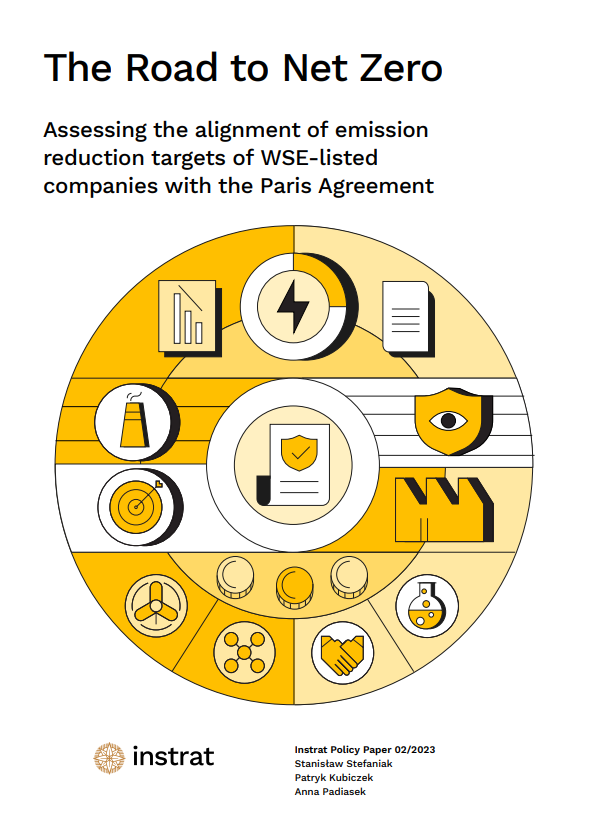Instrat’s experts warn – ¾ of 100 largest companies listed on the Warsaw Stock Exchange have not set any targets for reducing their greenhouse gas emissions. The adopted commitments are not aligned with the Paris Agreement – Polish companies are on a trajectory of 2.64°C temperature increase.
The experts analysed the GHG reduction targets of the largest companies listed on the Stock Exchange in Warsaw. – Unfortunately, Polish big business is not ready for climate challenges. So far, only 25 out of the 100 largest issuers on the WSE have set goals for reducing greenhouse gas emissions, however not all of these targets meet the Paris Agreement requirements. This is definitely not enough – says Stanisław Stefaniak, Head of Sustainable Finance Program at Instrat Foundation.
Slow pace of decarbonisation of Polish companies
Although the number of Warsaw Stock Exchange companies declaring emission reduction targets doubled in 2022, it is still disappointing compared to the largest Western indices. At the end of last year, 25 of the 100 largest issuers (WIG100) had such goals (26 entities in the 3 main indices associating 140 companies). What does it look like in the leading markets? Climate goals were set by 76 companies from the American S&P100 index, as many as 82 companies from the British FTSE100, and 40 issuers among the largest German public companies. – If we assume a linear increase in the number of companies with climate goals, Polish companies from the WIG100 will catch up with the British index in 2027, i.e. three years before 2030, which marks the milestone of EU climate policy. By that time, the emission reduction targets will ought to be implemented, and not just introduced – comments Stanisław Stefaniak.
Climate goals of Polish companies inconsistent with the Paris Agreement
The Instrat team analysed the compliance of the WSE companies’ goals with the Paris Agreement using the internationally recognized Temperature Rating methodology which translates the adopted reduction goals into a global increase in average temperatures at the end of the century (temperature score). Under the Paris Agreement, this increase should not exceed 1.5°C. – Meanwhile, the total increase in temperature implied by the emission reduction targets of companies listed on the Warsaw Stock Exchange is 2.64°C. This is well above the level permissible by the Paris Agreement, says Stanisław Stefaniak.
17 out of 26 companies have compliant emission reduction targets. However, for 6 of them, this assessment is based on short-term goals, which should be complemented by medium and long-term actions.
Regulatory duties ahead
GHG emissions reporting will soon become mandatory under the revised EU rules on non-financial reporting (CSRD). Companies will be required to take account of emissions in their supply chains and provide information on their emission reduction plans. What is more, the draft regulation on the EU standard of green bonds provides that their issuers should have decarbonisation plans. The number of market standards for assessing the reliability of climate commitments is also growing dynamically. – The development of legal regulations and market standards allows us to conclude that having decarbonisation plans in line with the Paris Agreement will increasingly be a precondition for access to sustainable finance. Such plans are rare on the Polish stock exchange, and those already adopted are not always sufficiently ambitious, and may make it difficult for companies listed on the Warsaw Stock Exchange to access external financing, the suppliers of which are increasingly paying attention to climate issues, says Stanisław Stefaniak.
Troublesome emissions in the value chain
The mere reporting of emissions by listed companies remains poor. Basic information in this regard is published by 63 WIG100 companies. However, only 7 companies count full emissions in the value chain, which provide a full picture of the company’s operations, often turning out to be many times higher than the companies’ own emissions. Estimates indicate that on average only 15% of Scope 3 (highest) emissions are reported, with some sectors reporting less than 1%. – Without information on emissions in the value chain, the emissions profile of a manufacturer of conventional and electric cars is difficult to distinguish. Meanwhile, Polish companies, even those reporting their own emissions, do not take the calculation of these emissions seriously, sums up Stanisław Stefaniak.


